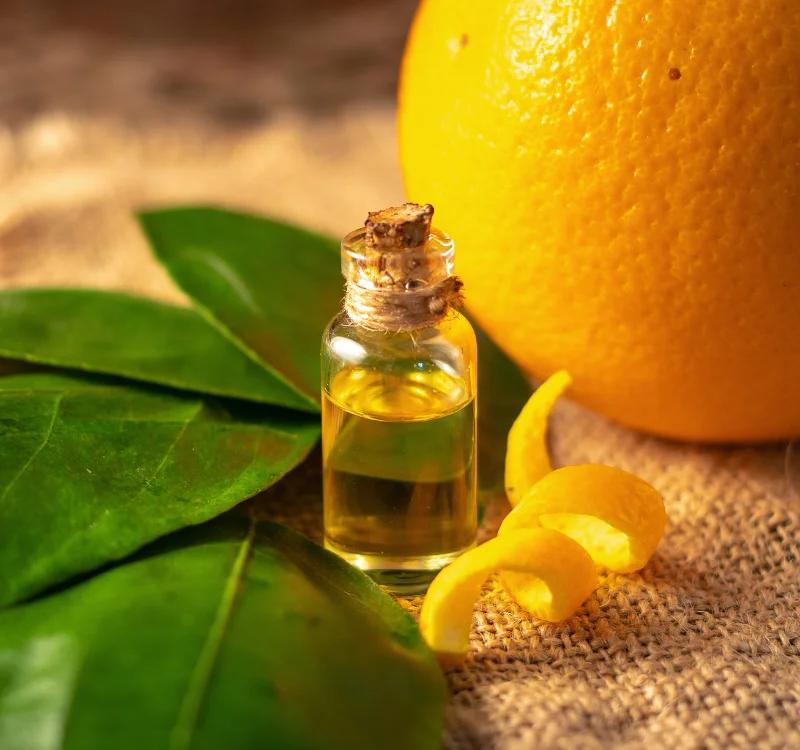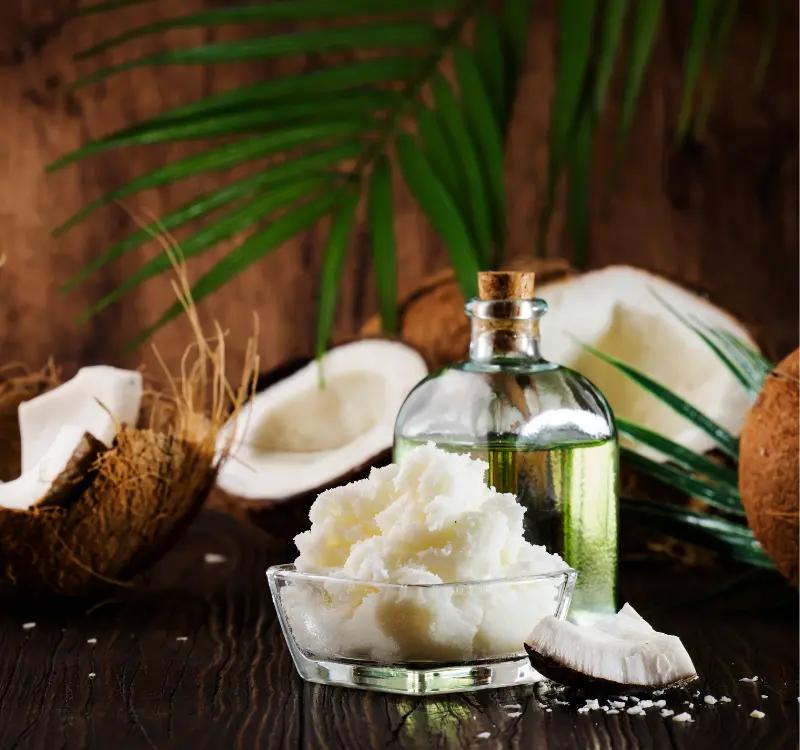Orange Oil Benefits: Get Ready to GLOW With This Magic Ingredient
Jul 20, 2024

Orange oil, derived from the peels of oranges through a cold-pressing process, is a concentrated extract renowned for its fresh, citrusy aroma and versatile uses.
Table of Contents:
- HISTORY OF ORANGE OIL - An Ayurvedic Perspective
- HOW IS ORANGE OIL EXTRACTED?
- ORANGE OIL USES
- ORANGE OIL BENEFITS
- ORANGE OIL BENEFITS FOR SKIN
- 6 WAYS TO USE ORANGE OIL FOR SKIN
- ORANGE OIL BENEFITS FOR HAIR
- HOW TO USE ORANGE OIL FOR HAIR
- POTENTIAL SIDE EFFECTS OF USING ORANGE OIL
- FAQs
Orange oil benefits find their real time application in cosmetic application, aromatherapy and natural cleaning products. It is also utilised in flavourings for its bright, zesty taste and in skin-brightening products. With its refreshing scent and beneficial properties, orange oil serves as a popular ingredient in various industries, contributing to both sensory experiences and functional applications.
Orange Essential Oil, often known as Sweet Orange Essential Oil, comes from the fruits of the Citrus sinensis plant. In contrast, Bitter Orange Essential oil is extracted from the fruits of the Citrus aurantium plant.
HISTORY OF ORANGE OIL - An Ayurvedic Perspective
Orange Oil, commonly known as Sweet Orange Essential Oil, is extracted from the fruits of the Citrus sinensis plant. In contrast, Bitter Orange Essential Oil is derived from the fruits of the Citrus aurantium plant. The precise origin of Citrus sinensis remains uncertain, as it is not found growing wild anywhere globally. However, botanists theorise it arose naturally as a hybrid between the Pummelo (C. maxima) and Mandarin (C. reticulata) plants, originating in the region spanning from southwest China to the Himalayas.
The Himalayan region in India holds a significant place in the evolutionary history of oranges, specifically the Citrus sinensis species, commonly known as sweet oranges. While the exact origin remains debated among botanists, it is believed that Citrus sinensis emerged as a natural hybrid between the pummelo (Citrus maxima) and the mandarin (Citrus reticulata) in an area stretching from southwest China to the Himalayan foothills.
The Himalayas, with their diverse climatic zones and fertile valleys, provided an ideal environment for citrus fruits to evolve and diversify. The gradual domestication and cultivation of sweet oranges likely began in these regions, where ancient agricultural practices nurtured their growth and spread.
Historically, the Himalayan region has been recognized for its rich biodiversity and as a cradle for various plant species. Citrus fruits, including oranges, played a crucial role not only as sources of nutrition but also in traditional medicinal practices and cultural rituals of indigenous communities across the region.
Today, the legacy of oranges' Himalayan origins continues, with the fruit being cultivated globally in regions with suitable climates. The ancient connection to the Himalayas underscores the importance of this mountainous region in shaping the genetic diversity and cultural significance of sweet oranges worldwide.
HOW IS ORANGE OIL EXTRACTED?
Orange oil, derived from the peel of fresh oranges, harnesses the essence of this vibrant fruit through meticulous extraction processes. Initially, the oranges are carefully selected for their quality and ripeness.
The extraction begins by separating the orange peels from the fruit. These peels are then processed through various methods such as grinding, chopping, or puncturing to facilitate the release of the volatile fatty oil glands housed within the peel cells.
One common method involves mechanically rolling the peels over a trough to puncture the essential oil pouches beneath their surface. This initiates the extraction of a liquid blend containing both orange juice and essential oil. Over time, these components naturally separate, allowing the essential oil to be meticulously collected.
Alternatively, in a method where orange essential oil is a by-product of orange juice production, the entire fruit is pressed to extract both juice and oil from the pulp. This mixture undergoes centrifugation to separate the lighter essential oil, which rises to the surface for collection.
To preserve the oil's antioxidants and active compounds, cold-pressing is often employed, preventing degradation from heat exposure. Following cold-pressing, some citrus oils undergo steam distillation, ensuring purity and potency. Other extraction techniques like solvent extraction, supercritical CO2 extraction, and turbo distillation offer varying advantages in yield and quality.
Post-extraction, orange oil exhibits hues ranging from orange-yellow to orange-brown, reflecting its natural origin. Its aroma is characterised by a light, fresh, and sweet fragrance, capturing the essence of freshly peeled oranges.
Orange Oil Uses
-Aromatherapy ( provides anti-depressant, antispasmodic, aphrodisiac, carminative, diuretic, sedative properties)
-Perfumery (known for its sublime natural scent)
-Cosmetics (tonic, anti-Oxidant, anti-Inflammatory, cleansing, stimulant properties)
-Culinary arts and medicinal uses (anti-Depressant, anti-Inflammatory, antispasmodic, antiseptic, carminative, diuretic, tonic, sedative, cholagogic, anti-bacterial, anti-microbial properties)
ORANGE OIL BENEFITS
Orange Oil primarily contains the following chemical components: Limonene, Monoterpene Hydrocarbons (β-Myrcene and α-Pinene), Alcohols (Citronellol, Geraniol, and Linalool), and Aldehydes (Neral).
Limonene:
-Anti-oxidant
-Stimulant
-Appetite suppressant
β-Myrcene:
-Analgesic
-Antibiotic
-Sedative
α-Pinene:
-Anti-inflammatory
-Antiseptic
-Expectorant
-Bronchodilator
Citronellol:
-Anti-fungal
-Sedative
-Antiviral
-Antimicrobial
-Antispasmodic
-Anti-inflammatory
-Antioxidant
-Anticonvulsant
Geraniol:
-Antioxidant
-Antibacterial
-Antiseptic
-Analgesic
Linalool:
-Sedative
-Antidepressant
-Anti-inflammatory
-Anti-anxiety
-Antiepileptic
-Analgesic
Neral:
-Apoptotic
-Anti-nociceptive
-Anti-inflammatory
ORANGE OIL BENEFITS FOR SKIN
Orange essential oil benefits for skin health and beauty are plentiful. Known for its potent antimicrobial properties, it effectively fights acne-causing bacteria, making it a valuable natural remedy in an era of increasing antibiotic resistance. This oil not only combats breakouts but also helps reduce inflammation, redness, and swelling associated with acne, promoting clearer and healthier skin.
Beyond its antibacterial effects, orange oil is prized for its ability to enhance skin complexion. It contains antioxidants that neutralise free radicals, helping to prevent premature ageing and reduce the appearance of wrinkles and dark spots. By stimulating collagen production, it improves skin elasticity and firmness, resulting in a more youthful appearance.
Orange oil is also beneficial for oily skin as it helps regulate sebum production, preventing clogged pores and reducing the likelihood of acne outbreaks. Its astringent properties tighten the skin and reduce excess oil, providing a mattifying effect without drying out the skin.
Moreover, orange oil has soothing and calming properties, making it suitable for sensitive skin types. It can alleviate irritation and itching, making it useful for conditions like eczema and dermatitis. When diluted properly with a carrier oil like coconut or jojoba oil, orange oil can be safely applied to sensitive areas to provide relief and promote healing.
In addition to its direct benefits for skin health, orange oil offers aromatherapeutic benefits that can uplift mood and reduce stress. Its refreshing citrus scent is known to promote feelings of happiness and relaxation, making it a popular choice in aromatherapy and skincare products.
When using orange oil topically, it's essential to perform a patch test first to check for any potential allergic reactions. Due to its phototoxic nature, it should be used with caution before exposure to sunlight or UV rays to prevent skin sensitivity or irritation.
Using Orange oil for skin is a versatile and effective way to elevate your skincare routines, offering a natural solution for acne, ageing skin, oily skin, and sensitive skin conditions. Its antioxidant, antimicrobial, and soothing properties make it a valuable ally in maintaining clear, radiant, and healthy skin.
6 Ways to Use Orange Oil for Skin
Diluted with a carrier oil such as coconut or jojoba, Orange oil can be applied topically to sensitive areas to provide relief and promote healing.
There are several effective ways to incorporate orange oil into your skincare routine:
1. Facial Cleanser: Add a few drops of orange oil to your regular facial cleanser to enhance its cleansing and purifying properties. This helps remove dirt, excess oil, and impurities from the skin.
2. Toner: Create a natural toner by mixing orange oil with witch hazel or rose water. Apply to the face using a cotton pad after cleansing to tighten pores and refresh the skin.
3. Moisturiser: Blend a few drops of orange oil with a carrier oil like jojoba or almond oil to create a nourishing moisturiser. Massage into the skin after cleansing to hydrate and soften.
4. Face Mask: Combine orange oil with clay (such as bentonite or kaolin) and water or apple cider vinegar to create a detoxifying face mask. Apply to the face, leave on for 10-15 minutes, then rinse off with warm water.
5. Spot Treatment: For targeted treatment of acne or blemishes, dilute orange oil with a carrier oil and apply directly to the affected areas using a cotton swab.
6. Aromatherapy: Enjoy the uplifting and mood-boosting benefits of orange oil by adding a few drops to a diffuser. Its citrus scent promotes relaxation and reduces stress, contributing to overall well-being.
8 Orange oil Benefits for Hair
Orange oil for hair offers a variety of benefits for hair health and care, making it a popular choice in natural hair care routines. Here are some of the main benefits:
1. Promotes Hair Growth: Orange oil stimulates circulation to the scalp, which can promote hair growth. Improved blood flow to hair follicles nourishes them with essential nutrients, encouraging healthier and stronger hair growth.
2. Strengthens Hair: Rich in vitamins and antioxidants, orange oil helps strengthen the hair strands from roots to tips. This can reduce hair breakage and split ends, promoting overall hair health and resilience.
3. Adds Shine: Orange oil has a natural ability to condition and moisturize the hair, adding a glossy shine. It smooths the hair cuticles, which reflects light better and enhances the appearance of shiny, lustrous hair.
4. Cleanses Scalp: Its antimicrobial properties help cleanse the scalp by removing dirt, excess oil, and product buildup. This promotes a healthier scalp environment, which is essential for optimal hair growth.
5. Controls Oil Production: Orange oil can help regulate sebum production on the scalp. By balancing oil levels, it prevents the scalp from becoming too oily or dry, which can contribute to scalp issues and hair problems.
6. Reduces Dandruff: The antimicrobial and anti-inflammatory properties of orange oil make it effective in reducing dandruff. It soothes irritated scalp conditions and helps eliminate flakes, promoting a healthier scalp.
7. Natural Conditioner: Orange oil acts as a natural conditioner, moisturizing and softening the hair strands. This can make hair more manageable, reducing frizz and improving overall texture.
8. Aromatherapy Benefits: Beyond its direct hair benefits, the uplifting citrus scent of orange oil provides aromatherapy benefits. It can improve mood, reduce stress, and enhance relaxation during hair care routines.
How to Use Orange Oil for Hair
Incorporating orange oil into your hair care routine can provide a natural and effective way to promote healthy hair growth, improve scalp health, and enhance overall hair appearance and manageability. You implement the effective usage of orange oil for hair in the following ways -
-Scalp Massage: Dilute a few drops of orange oil in a carrier oil like coconut or jojoba oil. Massage into the scalp for a few minutes to stimulate circulation and promote hair growth. Leave on for at least 30 minutes before shampooing.
-Hair Mask: Combine orange oil with a nourishing base such as yogurt, honey, or mashed avocado to create a hydrating hair mask. Apply to damp hair, focusing on the roots and ends. Leave on for 20-30 minutes before rinsing thoroughly.
-Shampoo Booster: Add a few drops of orange oil to your regular shampoo to enhance its cleansing and conditioning properties. This can help remove buildup and impurities while imparting a refreshing citrus scent.
-Leave-In Conditioner: Mix a few drops of orange oil with water in a spray bottle. Use as a leave-in conditioner to moisturise and detangle hair, leaving it smelling fresh and citrusy throughout the day.
-Hair Rinse: After shampooing, dilute orange oil in water and use it as a final rinse to add shine and fragrance to your hair. It also helps to seal the hair cuticles, making hair appear smoother and more manageable.
POTENTIAL SIDE EFFECTS OF USING ORANGE OIL
Using orange essential oil for hair and skin can provide various benefits, but it's important to be aware of potential side effects and precautions:
1. Skin Sensitivity: Orange oil is photosensitive, which means it can increase skin sensitivity to sunlight. Direct exposure to sunlight after applying orange oil topically may lead to sunburns, skin irritation, or hyperpigmentation, especially in fair-skinned individuals.
2. Allergic Reactions: Some people may be allergic to orange oil or its components. Allergic reactions can manifest as itching, rash, hives, or swelling. It's crucial to perform a patch test before using orange oil extensively on the skin to check for any adverse reactions.
3. Skin Irritation: Applying undiluted orange oil directly to the skin can cause irritation, especially for those with sensitive skin. It's recommended to dilute orange oil with a suitable carrier oil (such as coconut or jojoba oil) before applying to reduce the risk of irritation.
4. Eye Irritation: Care should be taken to avoid getting orange oil in the eyes, as it can cause irritation and discomfort. If accidental contact occurs, rinse thoroughly with water and seek medical advice if irritation persists.
5. Respiratory Sensitivity: Inhaling concentrated orange oil vapours directly from the bottle or diffuser may irritate the respiratory system, particularly in individuals with asthma or respiratory conditions. Ensure proper ventilation when using orange oil aromatically.
6.Digestive Upset: Ingesting orange oil orally is not recommended without the supervision of a healthcare professional. Ingestion can lead to digestive issues such as nausea, vomiting, or diarrhoea.
7. Skin Discoloration: Prolonged or frequent use of undiluted orange oil on the skin may potentially cause skin discoloration or changes in pigmentation, particularly in sensitive areas or if exposed to sunlight.
8. Photosensitivity: Due to its photosensitive nature, orange oil can increase the skin's sensitivity to UV radiation. It's advisable to avoid sun exposure for several hours after applying orange oil to the skin to minimise the risk of sunburns or skin reactions.
To safely use orange oil for hair and skin care:
-Always dilute orange oil with a carrier oil before applying topically.
-Perform a patch test before using extensively to check for allergic reactions.
-Avoid applying orange oil near the eyes or mucous membranes.
-Use caution when using orange oil in aromatherapy, ensuring proper ventilation.
-Consult a healthcare professional before ingesting orange oil or if you have any underlying health concerns.
Frequently Asked Questions
Yes, orange essential oil can be used for oily skin. Its antibacterial properties help reduce acne, and it can balance oil production. Always dilute with a carrier oil before application.
To use orange essential oil for skin, dilute it with a carrier oil, apply to clean skin, or add a few drops to your moisturiser. Always perform a patch test first.
Yes, orange essential oil is quite beneficial for the skin. It has antioxidant properties, can brighten complexion, and may help with acne. Always dilute with a carrier oil before applying.
To make orange oil at home, combine fresh orange peels with a carrier oil in a jar. Seal and let it infuse in a warm place for one to two weeks. Strain before use.
To make orange oil for skin lightening, combine orange peels with a carrier oil, such as jojoba or coconut oil. Let the mixture steep for a week, then strain and use.













